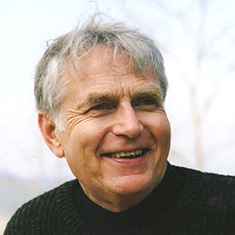Legal crusader
July 8, 2019 — It’s Tuesday afternoon on a mid-summer day, and Robert “Bob” Downs ’57 is hard at work.
The longtime attorney and civil rights advocate is drafting a resolution for the Illinois State Bar Association, objecting to the proposed citizenship question for the 2020 U.S. census.
“That question regarding citizenship of the respondent will discourage participation in the census and will result in lesser resources and representation to areas having substantial minority and undocumented populations,” he explains. “The Constitution doesn’t require such a question. It doesn’t take a rocket scientist to understand the partisan political purpose of this.”
 Robert "Bob" Downs ’57
Robert "Bob" Downs ’57
The feisty yet friendly Downs, 83, has been practicing law since 1965, after graduating from Florida’s Stetson University College of Law. Prior to that, he served in the U.S. Army and ran his own modestly successful business in Chicago.
“I could retire but I still enjoy law; I like helping people,” says Downs, who now specializes in family law and pro bono work, as well as serving on numerous boards and church service. “My work is challenging and every case is different, particularly family law. These are good people going through bad times.”
Downs has pared down his legal practice, shutting offices in downtown Chicago and Wheaton, and works from his home office with help from legal assistants.
The list of awards he’s earned and leadership positions he’s held is lengthy, and even today Downs is often called on to represent children in court. Years ago, he led an effort to rewrite child representation law for Illinois on behalf of the State Bar Association, though younger judges rarely know he’s the reformer behind those and other changes.
Downs was raised in Oak Park and met his late wife Barbara there through a church group. The two were engaged and married six months later in November 1963. She was the catalyst for him to settle down and go to law school at Stetson. While earning his law degree, he was witness to race riots, separate bathrooms, and other obvious examples of institutionalized racism in the South.
He decided if he was going to fight those things, he should do it in his own backyard. After graduating first in his class, Downs returned to Oak Park, which borders Chicago’s West Side, and launched his practice. Among many activities, he led the Oak Park/River Forest Citizen’s Committee for Human Rights, which brought about one of the strongest fair housing laws in the nation, and fought redlining and racial segregation as an Illinois state representative.
As president of the Illinois State Bar Association, the father of two led efforts requiring mandatory pro bono and continuing legal education requirements for Illinois lawyers. In the 1970s, he worked to establish free legal clinics in low-income communities, and he and his firm were heavily involved in helping independent candidates in Illinois run for office and navigate the political machine. After Barbara decided to go to law school and graduated in 1984, they practiced law together. The two were married for 46 years, until she passed away in 2010. “It was a perfect marriage,” Downs says. “My life began when I met Barb.”
He still has fond memories of Grinnell, where he ran cross country after briefly going out for football. “E.G. Booth was the line coach and quickly saw I might be better as a runner than a football player,” Downs says. “He was right! I wasn’t built like a runner but I became very good. George Drake ’56 was on the team then, and he was Grinnell’s best long distance runner. The rest of us weren’t far behind.”
Downs was captain one year of the cross country team, which won the Midwest conference championship. “It was an outstanding experience for me because for the first time in my life I was personally achieving something special,” he says.
Downs ran the 1992 New York City Marathon and a slew of 5 and 10k races, and today he still runs on a treadmill. “My mantra was and still is, ‘finish or die,’” he explains. “When I was at Grinnell, I stopped running briefly once during a practice when we got to the golf course, and I felt like such a failure. I never stopped running during training or a race again.”
He’s not done running his legal practice, either. “Today started with a deposition,” says Downs, about a recent pro bono case. He is fighting to make sure a young woman who was completely disabled from a car accident will get financial support from her husband, who is trying to get divorced and allegedly is hiding his assets. “This is a good example of what can go on,” says Downs.
“I basically have done everything I’ve wanted to,” he says looking back. “I don’t think I’d do anything different.”
— by Anne Stein ’84
For your information:
Pro bono work is one of the topics Grinnell students interested in legal careers learn about in the Center for Careers, Life, and Services Law Career Community.
To read more alumni news, check out our news archive.